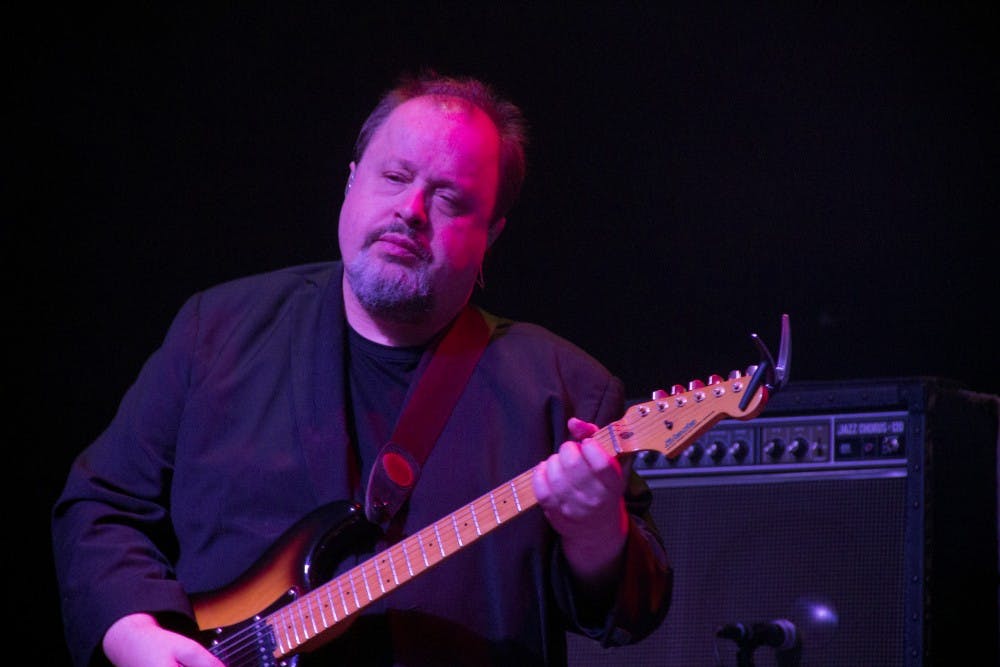After 18 studio albums, Marillion shows no signs of slowing down.
The band’s latest full-length offering “F.E.A.R.” is hailed by fans and critics as its best work in years, while also reaching number four on the UK album charts.
The Spectrum sat down with lead guitarist Steve Rothery to discuss the new album, its influences and the next steps for Marillion.
Q: “F.E.A.R.” is hailed by many as your best album in years. What was different about the approach to writing this album compared to previous releases?
A: The thing that really sets “F.E.A.R” apart is the way we tend to work. We all get together in a room and we jam, improvise and come up with new ideas. We record all these ideas, and then the producer sifts through these, finds the moments of magic and uploads those to a private SoundCloud account that we all listen to and comment on and rate according to our favorites. What we did with this album –– which we haven't done for a while –– is we only worked on the ideas that all five of us loved. Sometimes in the past, maybe three or even four people love an idea that the fourth or fifth person doesn’t love so much. And that can make it difficult for everyone to feel a part of the process and to know what you’re going to do.
Q: Frontman Steve Hogarth said that “F.E.A.R.” has a “sense of foreboding that permeates much of this record. I have a feeling we’re approaching some kind of sea change in the world.” What does “F.E.A.R.” mean to you?
A: It’s such a strange foretelling, really. Before Brexit, obviously before the elections and this situation. So the different aspects of making the record are obviously Steve’s lyrical development of his ideas, and then there’s a musical development that isn’t necessarily directly influenced by his lyrical content, it’s more of what is happening in the room at that moment. What’s interesting with this record is that Mike Hunter has taken credit for some of the arrangements, and we would also come back to an idea from maybe two years previously and take it and jam it and take it a step further. It was quite a long process, but I think it gave Steve time to develop some of the lyrical ideas more fully. As the tracks grew in size like “New Kings” and “El Dorado,” he would be re-writing and writing additional words, and everything just kind of solidified and I think it’s resulted in some of his best work.
Q: I’m interested that you mentioned Brexit. Obviously, politics have a lot to do with this record and there are plenty of political references across the board. Do you see the same application of themes to the current political climate in the U.S.?
A: Well, the last time we were in the states, the final night of our tour was in New York just off of Times Square on election night. We were playing some of the music from “F.E.A.R.” and as the election results started to come in, you could see this sort of wave of shock amongst the audience as people started getting messages on their phones. When we came out of the theater at the end of the night into Times Square, it was just silent people staring up at the big screens and just in shock. I think this will be looked upon in a certain way in the future. Again, you have elections every four years. For us, Brexit and the repercussions of that will go really for the rest of the foreseeable future; for our children and our children's children. To have this feeling of not only no longer being a part of Europe and all the difficulties that this is going to create in terms of studying abroad or working abroad. For us, come 2019, it’s a potential nightmare. We’ll see how that resolves itself. A lot of people woke up the morning of the Brexit result in a state of shock. It just shows that you only need a small percentage of the population to be swayed by propaganda or spin to tilt the balance, really.
Q: Marillion is often labeled as one of the pioneers of progressive rock. Do you agree? Where would you place Marillion’s music in the realm of rock music?
A: The problem with the labels is that it means different things to different people. Maybe it’s like somebody saying, “Oh, it’s this type of music” or “Oh, these guys sound like they’re stuck in the ‘70s.” The true meaning of prog rock for me is music that doesn’t have to follow conventional song structures. Music that can blend loads of influences whether it be folk, classical, blues, jazz even. You have this sort of hybrid melting pot of different musical styles that don’t have to conform to a verse-chorus, middle eight kind of structure. It’s lyrically giving you the freedom to develop things further compared to a conventional song structure. It can be like the difference between a short story and a novel in terms of how much you can actually cover over the course of long track or even over the course of a concept album. Really, for me, there’s only two kinds of music for any genre: good music or bad music of any genre. That’s really as simple as it goes. Anything else is –– not necessarily laziness –– but wanting to pigeonhole something. A lot of what we do is quite simple. It’s the way we develop the ideas and play together. It’s not about flash. It’s not about technique. It’s about melody and creating atmosphere. It’s an almost conventional experience compared to a simple band, I suppose.
Q: Marillion is acknowledged as playing a pivotal role in paving the way for crowdfunding and fan-funded music. What does that type of fan base support mean to you?
A: Oh, it’s great. You know that’s the reason we’re still here. We’ve seen major labels come and go. We’ve seen a lot of the print media and radio stations come and go. We’re still standing because, first of all, the strength of our fan base, and the fact that I don’t think we’ve ever compromised artistically. We’ve always made the music we wanted to make. In a way, it's a selfish process to do this. You make music that you personally enjoy, then you put it out there to the world hoping that other people are going to love it as well, and are willing to give you the money to make the next one. It’s an incredible freedom to have. We have our own studio where we write and rehearse and record. Other musicians come to this and they’re so jealous because it’s the holy grail for a band to have something like that. Sometimes it can be a distraction because it’s so close to where you live. I mean, for me, it’s about 15 minutes from my house. On this album we went to Real World a couple of times: Peter Gabriel’s studio. That’s just an incredible and insane place to work.
Brian Evans is the assistant arts editor and can be reached at brian.evans@ubspectrum.com.
Brian Evans is a senior English major and The Spectrum's senior arts editor.






